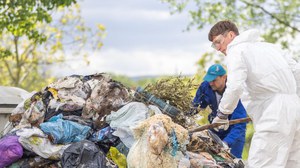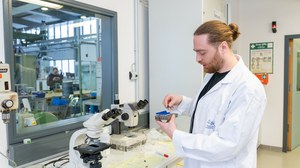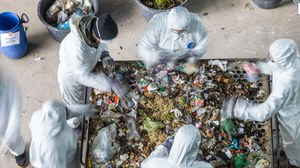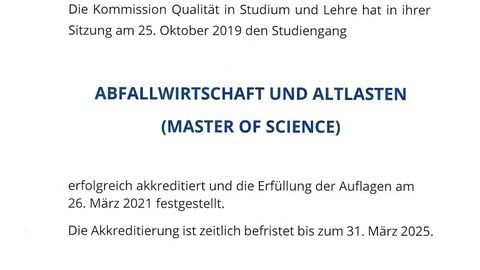STUDYING AT THE INSTITUTE OF WASTE MANAGEMENT AND CIRCULAR ECONOMY
The master's degree program in waste management and contaminated sites serves to train engineers who play a key role in solving a variety of environmental tasks. The studies is designed to train graduates who are able to solve complex problems in the field of waste management and contaminated site treatment. The graduate will usually specialize in individual subject areas, but he must understand the essential content of interdisciplinary teaching areas.
 © Sven Ellger
© Sven Ellger
MASTER'S PROGRAM "WASTE MANAGEMENT AND CONTAMINATED SITE TREATMENT"
Educational goals and career
The fields of waste management and contaminated sites have developed into an important, independent environmental science due to the requirements of modern industrial society.
The study is designed to train graduates who are able to solve complex problems in the field of waste management and contaminated site management. The graduate will usually specialize in individual subject areas, but he must understand the essential content of interdisciplinary teaching areas. Graduates are able to work constructively in the areas of planning, project management and operation of waste management- and recycling facilities, and the evaluation and remediation of contaminated sites through their broad technical knowledge, knowledge of scientific methods, and their abstraction- and transfer skills.
Graduates are able to work constructively in the areas of planning, project management and operation of waste management- and recycling facilities, and the evaluation and remediation of contaminated sites through their broad technical knowledge, knowledge of scientific methods, and their abstraction- and transfer skills.
The diverse processes and their complex relationships with the environment as well as economic considerations require cooperation with specialists from other disciplines in order to create comprehensive foundations for solving waste management and ecological problems.
The students acquire knowledge and skills in planning and practical areas:
- practical investigation of suspected contaminated sites, this means On-site exploration (planning and sampling on the contaminated site)
- Processing of water and soil samples, including the measurement and evaluation of the results
- Planning and execution of sampling
- Processing techniques of environmental samples
- current aspects of sampling, sample preparation, analytic and their application
- Measurement data interpretation
- Individual and collaborative planning of waste analyzes
- Basic knowledge of increasing the efficiency of waste management plants
- Economic analysis of waste treatment plants
- Life cycle assessments for process evaluation
- Methodical basics of risk assessment of contaminated sites
- Tools to explore natural processes for pollutant retention and degradation
- Assessment of contaminated sites with regard to the need for remediation
- Dimensioning of installations according to the types and extent of contamination
Graduates will find their fields of work in municipalities, associations and planning societies, in the environmental departments of industry and public service on issues of waste disposal, recovery and prevention, and in research and teaching in national and international research and higher education institutions. In economic structures, graduates are increasingly confronted with tasks such as conception and evaluation.






